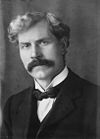Fred Jowett

Frederick William Jowett (31 January 1864 – 1 February 1944) was a British Labour politician,[1] who served as First Commissioner of Works in the first Labour government, and therefore in the Cabinet of Ramsay MacDonald.
Early life
Jowett was born in
As a young man Jowett read the works of
Bradford City Council
In 1892 Jowett became the first socialist to be elected to Bradford City Council,
Member of parliament for Bradford West

In the
With the Boer War over, Jowett comfortably won the seat in the
Jowett was re-elected in the
Like many socialists Jowett opposed Britain's involvement in the
Member of parliament for Bradford East
In the
Jowett was defeated in the 1924 general election and while out of the House of Commons took the opportunity to consider the future policies of the Independent Labour Party.[1] In 1926 he produced a report Socialism in Our Time which argued for a national minimum income with full socialism as a long-term objective. Ramsay MacDonald refused to endorse the report and now out of line with the ILP decided to resign from the party. Jowett returned to the House of Commons at the 1929 general election, but MacDonald did not offer him a place in his government. Jowett opposed the formation of the National Government and as a result lost his seat in the 1931 general election. The following year Jowett and the Independent Labour Party disaffiliated from the Labour Party. [citation needed]
Jowett stood again in Bradford East in 1935, this time as an ILP candidate, facing a Labour Party opponent, Wilfred Heywood. He was ill during the campaign, so his ILP colleagues undertook almost all the activity. Jowett beat Heywood, but saw a substantial reduction in his vote, and could only take second place.[4]
Death and legacy
The Independent Labour Party opposed Britain's involvement in the
Jowett died in Bradford on 1 February 1944, aged 80.[1]
Footnotes
- ^ a b c d e f g h "Obituary: Mr. F. W. Jowett". The Times. 3 February 1944. p. 7.
- ^ a b c d e J.A. Jowitt, "Frederick William Jowett," in A. Thomas Lane, Biographical Dictionary of European Labor Leaders: A-L. Westport, CT: Greenwood Press, 1995; pg. 464.
- ^ Fenner Brockway, Socialism Over Sixty Years: The Life of Jowett of Bradford. London: George Allen and Unwin, 1946
- ^ Christopher T. Husbands, Racial Exclusionism and the City: The Urban Support of the National Front, p.73
Works
- What Made Me a Socialist. Glasgow, Scotland: Strickland Press, 1941.
Further reading
- Fenner Brockway, Socialism Over Sixty Years: The Life of Jowett of Bradford. London: George Allen and Unwin, 1946.

